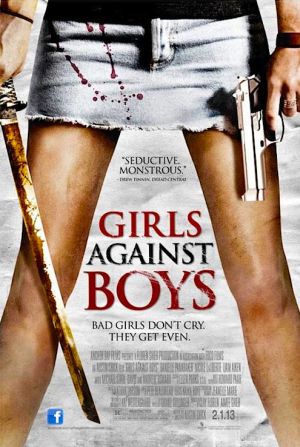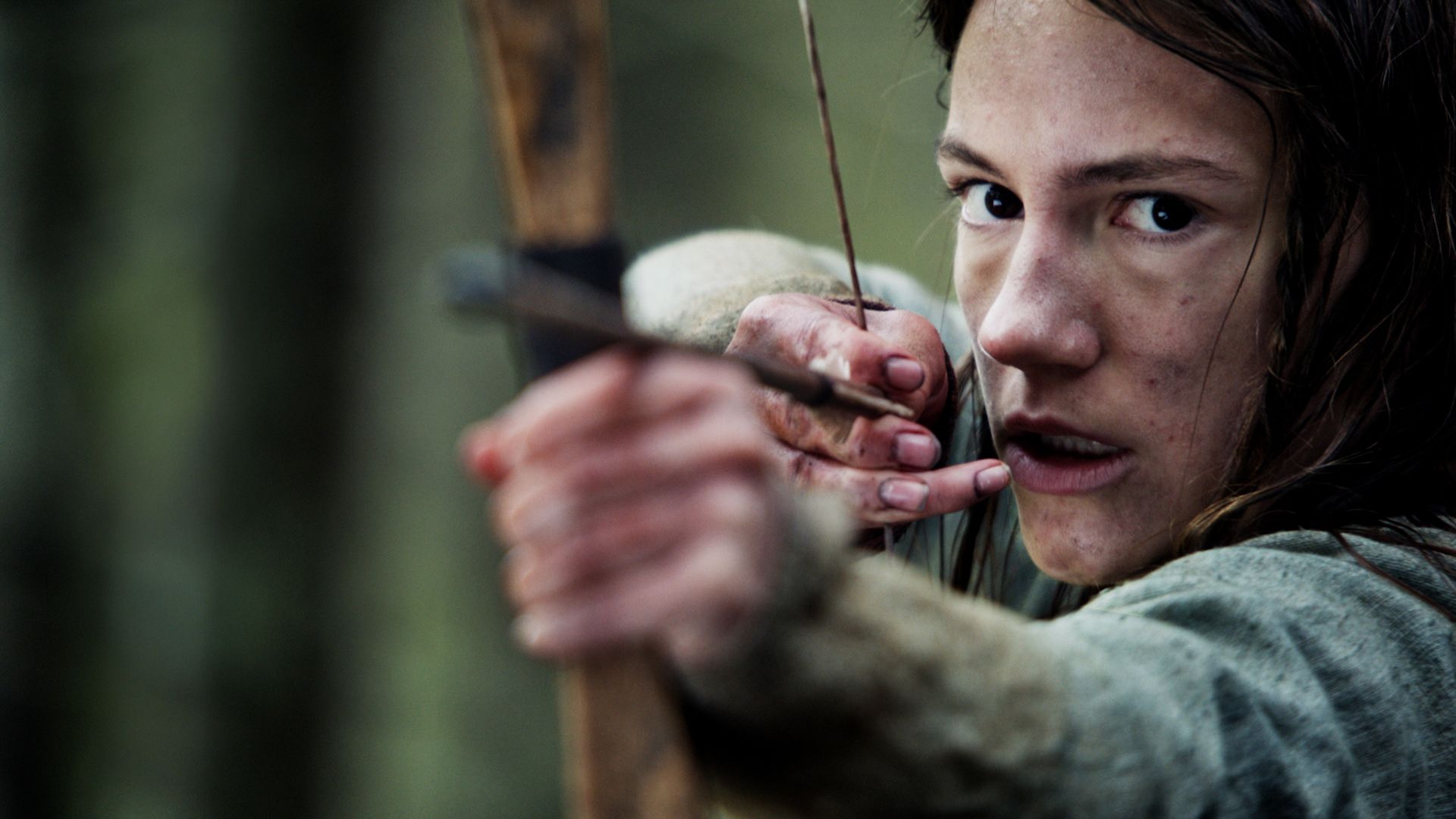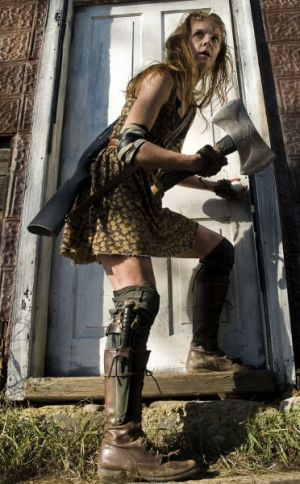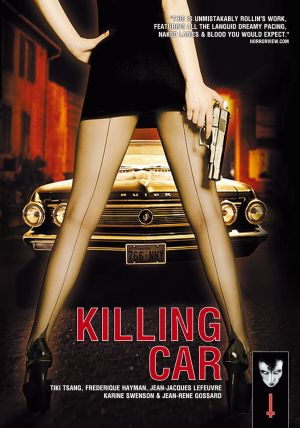★★★
 Zeiram and its sequel, Zeiram 2, both concern a creature which combines all the most unpleasant and lethal features of The Thing with The Terminator. It’s humanoid, at least in the number of functioning limbs, but its head appears almost mushroom shaped – though it’s hard to tell where Zeiram ends and its hat begins, for there’s a second face, embedded in the hat. This is capable of extending on a tentacle, to attack victims, taking in nourishment, and there’s evidence to suggest that it can absorb their DNA and use it to create monsters. Oh, and the rest of it is almost impossible to destroy.
Zeiram and its sequel, Zeiram 2, both concern a creature which combines all the most unpleasant and lethal features of The Thing with The Terminator. It’s humanoid, at least in the number of functioning limbs, but its head appears almost mushroom shaped – though it’s hard to tell where Zeiram ends and its hat begins, for there’s a second face, embedded in the hat. This is capable of extending on a tentacle, to attack victims, taking in nourishment, and there’s evidence to suggest that it can absorb their DNA and use it to create monsters. Oh, and the rest of it is almost impossible to destroy.
However, trying to do exactly that is Iria (Moriyama), an interstellar bounty hunter, who has laid a trap to take Zeiram into an alternate, uninhabited dimension, in order to deal with him in a way that will pose no threat to the local population. However, she reckons without the arrival of electrical techs Kamiya (Hotaru) and Teppei (Ida), who have been dispatched by the power company to investigate the power-drain resulting from Iria’s tech. Through an unfortunate series of events, they end up in the alternate dimension with Zeiram, while Iria is largely stuck in our world, trying to keep them alive until she can fix her portal and get in there to help them.
The problems here are largely two-fold. Kamiya. And Teppei, There are few things less appealing than comic relief characters whose antics and mugging are supposed to be endearing or amusing, but fail miserably on both fronts. They bring very little to proceedings except for running time, and that’s a shame, because there is no shortage of bizarre inventiveness on view. And when the pair stop trying to be characters, shut the hell up, and simply team up with Iria to kick alien arse, it’s a lot better, because whatever they do to Zeiram, he/she/it just keeps mutating into another form and fighting back. You get the sense being fed through a wood-chipper would only be a minor inconvenience.
This also helps cover up Moriyama’s somewhat limited set of fighting skills. Admittedly, it’s possible she had to slow things down in order to fight a giant mushroom, but the hand-to-hand combat here is choreographed at about the speed of a Strauss waltz. She does have screen presence, however, and looks decent enough firing a gun. To a casual eye – that’d be my wife’s, wandering through the living-room – this could look like an episode of Amemiya’s Power Rangers, and it’s not surprising he would go on to direct some Kamen Rider films. But it’s too uneven to succeed: for every moment where you go, “Cool!”, there’s another where you’ll roll your eyes, or just go “Eh?”. For instance, the section where Zeiram squeeze out goo onto the ground, which grows into a half-man that has a burbling conversation with Zeiram, before getting its head stomped on. Altogether, now: eh?
 The sequel, which came out three years later, restores the “i” in the title, which was inexplicably removed from the original for it US release by Fox Lorber. This installment starts off as if it’s going to go in some radically different directions, even if all the main players are back. Iria is seeking an ancient artifact called the Carmarite, and additionally, has a new assistant, but he turns out to be untrustworthy. Meanwhile, a shadowy group has succeeded in regenerating Zeiram as a cyborg warrior (which makes a lot more sense if you’ve seen the anime, and know its origins), bending its will to their needs and turning it into a weapon. While initially successfully, this works about as well as most plans usually do, and it’s not longer before Zeiram is much more a menace than an ally.
The sequel, which came out three years later, restores the “i” in the title, which was inexplicably removed from the original for it US release by Fox Lorber. This installment starts off as if it’s going to go in some radically different directions, even if all the main players are back. Iria is seeking an ancient artifact called the Carmarite, and additionally, has a new assistant, but he turns out to be untrustworthy. Meanwhile, a shadowy group has succeeded in regenerating Zeiram as a cyborg warrior (which makes a lot more sense if you’ve seen the anime, and know its origins), bending its will to their needs and turning it into a weapon. While initially successfully, this works about as well as most plans usually do, and it’s not longer before Zeiram is much more a menace than an ally.
However, just when you think the film is going into new and interesting territory… Well, I’m not quite show how it happened, but before long we were back in more or less the same situation as the original. Blah blah irritating comic relief blah another dimension blak Iria unable to help (this time because she gets herself locked in a room), etc. You’re looking at something which borders on being a remake of the original, and unlike something like Terminator 2, which upped the ante significantly, while telling a largely similar story, there isn’t any real sense of progression or development. Much as before, things do get better when things move into action, and Zeiram is again, a shape-shifting nightmare that won’t stay dead. And this time, not even a cute dog which strays into proceedings is off the menu.
It also helps that, this time around, Moriyama has a better handle on the action angle. Previously, it was very much a case of kick, pause, punch, pause, move, but she is a good deal more fluid here, and makes for a more credible heroine as a result. However, her strength is still more in the “looking cool with a gun” department, because her punches still look like they might be troubled by a damp paper-bag. On balance, the sequel’s lack of invention is approximately balanced by the overall improvement in Iria’s character and the slightly better overall production values – it still looks like you could fund it from your bedside table change – and it’s as worth watching as the first part. Which would be “somewhat”: call both of them a rent (or more likely these days, a download), rather than a buy.
Dir: Keita Amemiya
Star: Yûko Moriyama, Mizuho Yoshida, Kunihiro Ida, Yukijirô Hotaru
 Kinda odd to see Dickerson – cinematographer on a lot of Spike Lee’s movies, and Eddie Murphy’s Raw – directing this Lifetime original movie. It’s certainly not edgy, though that’s not what Lifetime is exactly about. You largely know what you’re going to get with their output. Something technically decent, usually with decent enough performances, but something that clings to the viewer’s comfort zone like a limpet. Is it wrong to criticize the channel for that, when it has absolutely no interest in pushing the envelope? It’d be a bit like coming down on Disney for making kids movies. It’s what they do: deal with it.
Kinda odd to see Dickerson – cinematographer on a lot of Spike Lee’s movies, and Eddie Murphy’s Raw – directing this Lifetime original movie. It’s certainly not edgy, though that’s not what Lifetime is exactly about. You largely know what you’re going to get with their output. Something technically decent, usually with decent enough performances, but something that clings to the viewer’s comfort zone like a limpet. Is it wrong to criticize the channel for that, when it has absolutely no interest in pushing the envelope? It’d be a bit like coming down on Disney for making kids movies. It’s what they do: deal with it.




 Shae (Panabaker) is not having the best luck with men. Her older boyfriend just dumped her, to try to get back with his wife, and a night where she drinks to forget ends up with her being raped in the stairwell of her apartment building. Fortunately, there to lend a helping hand is Lu (LaLiberte), a barmaid who turns out to have a dark side. A really dark side. As in, when Shae is reporting her rape. Lu takes the desk sergeant to a motel, handcuffs to the bed, sticks a gun into his crotch and pulls the trigger. When the authorities prove about as useful as they usually are in this situation, Lu helps Shae take revenge on the bastard who raped her. Then his friends. Then the ex-boyfriend. But when Shae finds a guy who might actually not be a total douche-bag, Lu is still thoroughly unimpressed.
Shae (Panabaker) is not having the best luck with men. Her older boyfriend just dumped her, to try to get back with his wife, and a night where she drinks to forget ends up with her being raped in the stairwell of her apartment building. Fortunately, there to lend a helping hand is Lu (LaLiberte), a barmaid who turns out to have a dark side. A really dark side. As in, when Shae is reporting her rape. Lu takes the desk sergeant to a motel, handcuffs to the bed, sticks a gun into his crotch and pulls the trigger. When the authorities prove about as useful as they usually are in this situation, Lu helps Shae take revenge on the bastard who raped her. Then his friends. Then the ex-boyfriend. But when Shae finds a guy who might actually not be a total douche-bag, Lu is still thoroughly unimpressed.
 14th-century Norway, not long after the Black Death has decimated the population. Signe (Andreasen) and her family are on the road, seeking a new life, when they are attacked by bandits. Signe is captured and taken to their camp, ruled by Dagmar (Berdal); she was expelled from the nearby town, whose inhabitants thought she was a witch. Signe isn’t the first girl abducted to give the matriarch a family; there’s also Frigg (Olin), a younger girl whom Dagmar is inducting into the ways of the clan. But Frigg is not there yet, and help Signe to escape: needless to say, an enraged Dagmar and the rest of her gang, are soon hot in pursuit, chasing them across the chilly (and beautifully-photographed) wilderness.
14th-century Norway, not long after the Black Death has decimated the population. Signe (Andreasen) and her family are on the road, seeking a new life, when they are attacked by bandits. Signe is captured and taken to their camp, ruled by Dagmar (Berdal); she was expelled from the nearby town, whose inhabitants thought she was a witch. Signe isn’t the first girl abducted to give the matriarch a family; there’s also Frigg (Olin), a younger girl whom Dagmar is inducting into the ways of the clan. But Frigg is not there yet, and help Signe to escape: needless to say, an enraged Dagmar and the rest of her gang, are soon hot in pursuit, chasing them across the chilly (and beautifully-photographed) wilderness.

 Zeiram and its sequel, Zeiram 2, both concern a creature which combines all the most unpleasant and lethal features of The Thing with The Terminator. It’s humanoid, at least in the number of functioning limbs, but its head appears almost mushroom shaped – though it’s hard to tell where Zeiram ends and its hat begins, for there’s a second face, embedded in the hat. This is capable of extending on a tentacle, to attack victims, taking in nourishment, and there’s evidence to suggest that it can absorb their DNA and use it to create monsters. Oh, and the rest of it is almost impossible to destroy.
Zeiram and its sequel, Zeiram 2, both concern a creature which combines all the most unpleasant and lethal features of The Thing with The Terminator. It’s humanoid, at least in the number of functioning limbs, but its head appears almost mushroom shaped – though it’s hard to tell where Zeiram ends and its hat begins, for there’s a second face, embedded in the hat. This is capable of extending on a tentacle, to attack victims, taking in nourishment, and there’s evidence to suggest that it can absorb their DNA and use it to create monsters. Oh, and the rest of it is almost impossible to destroy. The sequel, which came out three years later, restores the “i” in the title, which was inexplicably removed from the original for it US release by Fox Lorber. This installment starts off as if it’s going to go in some radically different directions, even if all the main players are back. Iria is seeking an ancient artifact called the Carmarite, and additionally, has a new assistant, but he turns out to be untrustworthy. Meanwhile, a shadowy group has succeeded in regenerating Zeiram as a cyborg warrior (which makes a lot more sense if you’ve seen the anime, and know its origins), bending its will to their needs and turning it into a weapon. While initially successfully, this works about as well as most plans usually do, and it’s not longer before Zeiram is much more a menace than an ally.
The sequel, which came out three years later, restores the “i” in the title, which was inexplicably removed from the original for it US release by Fox Lorber. This installment starts off as if it’s going to go in some radically different directions, even if all the main players are back. Iria is seeking an ancient artifact called the Carmarite, and additionally, has a new assistant, but he turns out to be untrustworthy. Meanwhile, a shadowy group has succeeded in regenerating Zeiram as a cyborg warrior (which makes a lot more sense if you’ve seen the anime, and know its origins), bending its will to their needs and turning it into a weapon. While initially successfully, this works about as well as most plans usually do, and it’s not longer before Zeiram is much more a menace than an ally. According to the film’s introductory narration, Thailand now has about three women for every man. This has led to many men both having an “official” wife, while also keeping a mistress, and not exactly being secretive about it – when the wife dies, the mistress gets “promoted” to replace her, which has obvious implications for both parties. In order to protect their rights, the eives form an association, the FCWI, which stands for First Class Wives International. Not to be outdone, the mistresses do the same thing, with the ECWI (Economy Class Wives International). After two members of the former are gunned down on a stretch of highway, the two groups seem set for a fiery and murderous collision between the wives and mistresses.
According to the film’s introductory narration, Thailand now has about three women for every man. This has led to many men both having an “official” wife, while also keeping a mistress, and not exactly being secretive about it – when the wife dies, the mistress gets “promoted” to replace her, which has obvious implications for both parties. In order to protect their rights, the eives form an association, the FCWI, which stands for First Class Wives International. Not to be outdone, the mistresses do the same thing, with the ECWI (Economy Class Wives International). After two members of the former are gunned down on a stretch of highway, the two groups seem set for a fiery and murderous collision between the wives and mistresses. There are times when not saying too much can work for a film; Night of the Living Dead is the classic example, and it works, because you don’t
There are times when not saying too much can work for a film; Night of the Living Dead is the classic example, and it works, because you don’t  This is a surreal revenge thriller, which begins at a scrapyard where the bickering of a couple is interrupted by an Oriental woman (Tsang), who shoots them dead and takes a car. A series of similar encounters follows, which take a similar form: we are introduced to one or more characters; then the woman shows up, and kills them, leaving a toy car behind at the scene as a marker. This includes a photographer and her assistant; an antiques dealer and his girlfriend; the owner of a dance club, etc. Meanwhile, two cops are following the trail of corpses and Hot Wheels, and it gradually becomes clear that the woman’s actions are tied to a car accident the previous year, with which all her victims had a connection of some kind.
This is a surreal revenge thriller, which begins at a scrapyard where the bickering of a couple is interrupted by an Oriental woman (Tsang), who shoots them dead and takes a car. A series of similar encounters follows, which take a similar form: we are introduced to one or more characters; then the woman shows up, and kills them, leaving a toy car behind at the scene as a marker. This includes a photographer and her assistant; an antiques dealer and his girlfriend; the owner of a dance club, etc. Meanwhile, two cops are following the trail of corpses and Hot Wheels, and it gradually becomes clear that the woman’s actions are tied to a car accident the previous year, with which all her victims had a connection of some kind. Evil mastermind Snakehead (Liu) kidnaps eight of the world’s top assassins, and transports them to a bunker in his Bangkok lair, where he makes them fight each other to the death, laughing maniaally all the while. Why? Because he’s an evil mastermind, that’s why: it’s what they
Evil mastermind Snakehead (Liu) kidnaps eight of the world’s top assassins, and transports them to a bunker in his Bangkok lair, where he makes them fight each other to the death, laughing maniaally all the while. Why? Because he’s an evil mastermind, that’s why: it’s what they  This starts with a memorable sequence in which Inoshika Ocho (Ike) fights off a number of attackers, armed only with her umbrella; albeit, an umbrella that is rather more heavily-armed than most. While she succeeds, she ends up losing all of her clothes in the process, leading to some artful staging in which the discarded umbrella is used to hide her naughties bits. Unfortunately, the rest of the film, while occasionally reaching the same levels of unsanity is largely crude and unpleasant. Even the central concept – a gang smuggling drugs in the vaginas of junkies – falls firmly into that category.
This starts with a memorable sequence in which Inoshika Ocho (Ike) fights off a number of attackers, armed only with her umbrella; albeit, an umbrella that is rather more heavily-armed than most. While she succeeds, she ends up losing all of her clothes in the process, leading to some artful staging in which the discarded umbrella is used to hide her naughties bits. Unfortunately, the rest of the film, while occasionally reaching the same levels of unsanity is largely crude and unpleasant. Even the central concept – a gang smuggling drugs in the vaginas of junkies – falls firmly into that category.